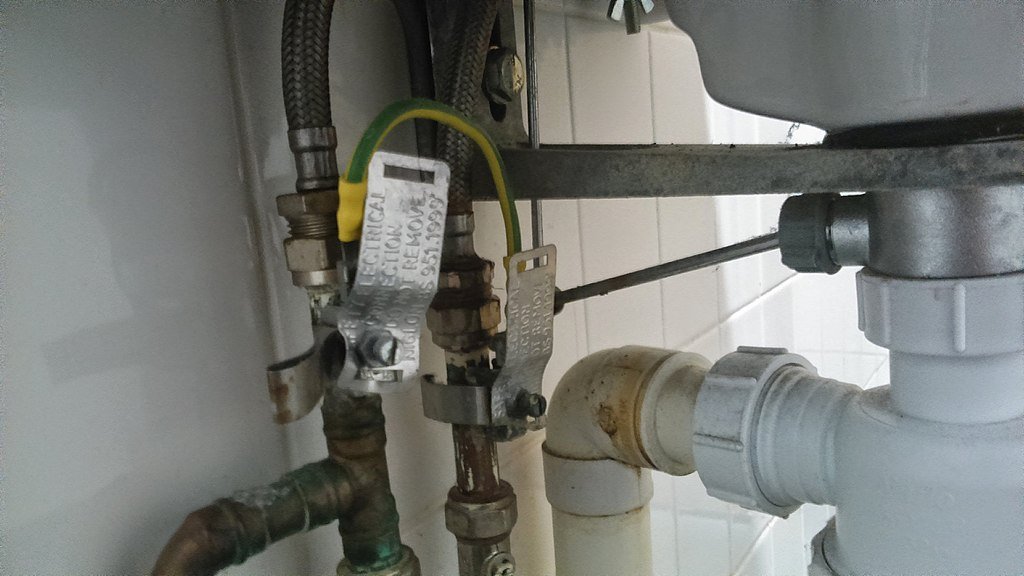Table of Contents Show
Are you itching to use those DIY plumbing tools you just bought? Looking for some awesome DIY plumbing hacks to try them out on?
Then, we beg you, please read this guide first! The fact is that DIY plumbing can lead to serious complications and cause extreme damage to your house.

For example, your amateur plumbing solution can leave behind a minor leak in your home. The leak might be so small that you don’t notice it for months. But, all that time, it trickles water into the walls and floors, causing extensive water damage.
Other DIY plumbing attempts can be harmful or even fatal. For instance, a water heater installation mistake can electrocute you. And a botched gas line repair can lead to explosions or carbon monoxide poisoning.
So, don’t start your project just yet. First, read these warnings to learn which DIY plumbing tasks you should always avoid.
1. Designing Your Own Plumbing Plan
Are you designing and building your own house from scratch? We commend you on your determination!
Still, plumbing is one of the most important aspects of adhering to building codes/government standards. And there are plenty of reasons why.
First, bad plumbing design can cause all sorts of plumbing problems in the building, such as bursts or leaky pipes. Secondly, plumbing includes gas lines. And gas line mishaps are both poisonous and flammable.
Thirdly, these bad plumbing decisions may connect to the same water main and sewer that the rest of your neighborhood uses. Thus, your plumbing design could affect other homes as well. Even if you use a septic tank, your septic problems might spill into your neighbor’s property.
It’s imperative that you hire a professional plumbing company to design your plumbing plan. Search online for “local plumbers near me” to compare your options.
Read Also:
2. Gas Line Repairs
We mentioned how dangerous it is to work with gas lines. In case it still isn’t clear, a gas leak is an emergency situation that can kill you in minutes.
If the gas leak is ignited, for instance, your whole house could explode. But the most frightening danger of gas leaks is carbon monoxide poisoning.
According to the CDC, those who are sleeping or who have recently consumed alcohol can die before ever displaying symptoms. In short, you should never, ever try to fix a gas leak yourself. The only things you should do when you smell a gas leak are to evacuate the house and call your gas company.
3. Underground Plumbing Repairs
Some plumbing repairs require you to access underground pipes. However, it’s dangerous to go digging around on your property if you don’t know what you’re doing. As with the above examples, this can make things worse for both you and your neighbors.
And, for this same reason, it’s usually illegal. Unless you have the training and permits to do such work, don’t.
4. Installing an Appliance
If you’re installing a garbage disposal or some other appliance that attaches to one sink, that’s fine. These projects won’t affect the plumbing of your whole house. And a garbage disposal doesn’t even hook up to the water supply, only the drain.
Plus, these appliances are located where you can see and access them easily. So, you’ll notice if there are any leaks or other problems and you can repair them yourself.
On the other hand, you should not attempt to hook up larger appliances, such as dishwashers, washing machines, and water heaters. These connect not only to your water supply pipes but to your electricity as well. If you’re not careful, this is a recipe for electrocution.
Also, you might not seal the connections well enough. If one of these connections springs a leak, it will probably be concealed by the appliance. By the time you notice and repair the leak, your house will most likely suffer water damage.
5. Fixing a Burst Pipe
It’s no secret that experts complete the tasks of their trades faster than amateurs. When it comes to plumbing repairs, this speed factor is more than mere convenience.
Case in point, a burst pipe that floods your home needs to be addressed with no delay. It doesn’t take long for the moisture to cause permanent damage if the flooding is not stopped and dried up quickly enough. Additionally, mold can grow in as little as 24 hours on damp surfaces that aren’t dried properly.
Plumbers have the expertise to get the job done fast so you can start drying out your house. Plus, they may use water pumps and other tools/methods to help remove the excess water efficiently.
It’s fine if you want to repair small leaks on your own. But, for burst pipes and other large leaks, call a professional.
6. Repairing/Unclogging a Sewer Line
Likewise, do not attempt a DIY solution for any problems that indicate a broken or clogged sewer line. Signs of this problem include:
- Sewage backup from your drains
- Bad odors from your drains
- Sewage smell and large puddles in your yard
Trust us: you do not want to make these problems worse with your amateur meddling. If you notice these issues, call a professional plumber.
Remember These DIY Plumbing Don’ts
It’s extremely important that you remember the warnings we described in this guide today. These are serious problems that can lead to harm or death if you attempt a DIY plumbing solution. Always call a professional to deal with any of these problems.
Now, let’s talk about some DIY projects you should try. Learn about comfortable DIY bench ideas or how to build a garden tool rack yourself. Find these and other amazing tips in our DIY and Home Improvement Archives.









